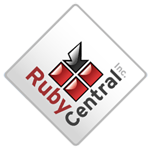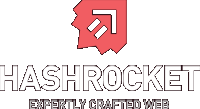Ruby Conference India 2010 - Logo
RubyConf India 2010
India's first RubyConf is happening in Bangalore in March 2010. RubyConf India is presented by the Ruby Community in India and supported by RubyCentral and the Innovation & Technology Trust.Royal Orchid Hotel, Bangalore
Speakers
-

Nick Sieger
Nick Sieger is an engineer at Engine Yard, working on JRuby and leading the effort to make the Java Virtual Machine a robust yet easy-to-use deployment platform for Rails and Ruby web applications. He created and co-maintains the JDBC adapter for ActiveRecord that JRuby on Rails uses for database connectivity, as well as the Warbler tool and JRuby-Rack library for dealing with Java application server deployment. He maintains a blog on Ruby and JRuby-related topics at http://blog.nicksieger.com/.
Talk: Exploring Rails 3 Through Choices
One of the most eagerly anticipated aspects of the fast-approaching Rails 3 release is its inherent modularity, and how that modularity gives the application developer more choice. We'll start with a tour of some of the headlining differences between Rails 2 and 3, and then put Rails 3's internal architecture to the test by demonstrating how to plug in some non-standard standard components, including an example of how to wire in a Java library using JRuby.
Presentation:
Slides:- http://www.slideshare.net/ThoughtWorks0ffshore/sieger-rails3ruby-confindia2010Speech:- http://download01.thoughtworks.com/media/rubyconf/nickseiger
-

Ola Bini
Ola Bini works as a language geek for ThoughtWorks in Chicago. He is one of the JRuby core developers and have been involved in JRuby development since 2006. At one point in time, Ola got tired of all existing programming languages and decided to create his own, called Ioke. He has written a book called Practical JRuby on Rails Projects for APress, talked at numerous conferences, and contributed to a large amount of open source projects. His main passion lies in implementation languages, working on regular expression engines, trying to figure out how to create good YAML parsers - all with the final goal of taking our understanding of languages to the next level..
Talk: Present and Future of Programming Languages
Programming languages are at the core of our profession. But we don't always give them as much credence as they deserve. The strength of Ruby lies in its heritage from a number of different languages, and a look at the history leading up to Ruby might reveal what lies in store for the future. At the moment a lot of attention is spent looking at programming languages and developers are realizing that your language is an important tool. I will talk a little bit about why languages matter, why you should know several, and what the future of languages might look like.
Presentation:
Slides:- http://www.slideshare.net/ThoughtWorks0ffshore/programming-languages-ola-biniSpeech:- http://download01.thoughtworks.com/media/rubyconf/ola
-

Arun Gupta
Arun Gupta is a GlassFish Evangelist working at Sun Microsystems. Arun has over 13 years of experience in the software industry working in various technologies, Java(TM) platform, and several web-related technologies. In his current role, he works very closely to create and foster the community around GlassFish. He has been with the Java EE team since it’s inception. And since then he has contibuted to all Java EE releases. He is a prolific blogger at and http://blogs.sun.com/arungupta. This blog has over 1000 blog entries with frequent visitors from all over the world reaching up to 25,000 hits/day.
Talk: GlassFish supports multiple Ruby web frameworks ... really?
GlassFish is an open source and production-quality application server with full enterprise support from Sun Microsystems. In addition to traditional Java EE applications, it allows applications developed using different Ruby frameworks to be easily deployed as well. The choice of application frameworks is also available for Groovy/Grails and Python/Django apps and can be easily extended further.
This talk will demonstrate how GlassFish provides an extensible framework that allow applications created using different Ruby frameworks can be easily deployed. The attendees will learn the different deployment models available in GlassFish through live coding examples and several customer use cases of Rails deployments on GlassFish. The talk will show how Rails, Sinatra, Merb and any Rack-based framework can be easily deployed on GlassFish. It demonstrates how popular Rails applications can be easily deployed on GlassFish without any modification, and shows how GlassFish Gem can be used as an effective alternative to WEBrick, Mongrel, and other traditional deployment models.
It also explains the inner workings of GlassFish so that developers understand what’s happening under the hood. It will explain how standard Java monitoring technologies like JMX can be used to monitor/manage these applications.
The session also demonstrates how NetBeans provides a comprehensive IDE for developing, running, and debugging a Rails application directly on GlassFish – all without using any Java code.
Presentation:
Slides:- http://www.slideshare.net/ThoughtWorks0ffshore/arun-gupta-glass-fish-rubyconfindia2010 -

Obie Fernandez
Obie is a recognized tech industry leader that has been hacking computers since he got his first Commodore VIC-20 in the Eighties, and found himself in the right place and time as a programmer on some of the first Java enterprise projects of the mid-Nineties. He has been evangelizing Ruby and Rails online via blog posts and publications since early 2005 and specializes in the development and marketing of large-scale, web-based applications. Obie is CEO and Founder of Hashrocket, one of the world's premier web design and development firms. He is also the author of The Rails Way, a comprehensive guide to Ruby on Rails standards and development.
Talk: Blood, Sweat and Rails 2010
Take a break from the technical mumbo-jumbo and listen to Obie leverage his wit and real-life experience in what promises to be an entertaining and insightful session geared towards current and aspiring Rails entrepreneurs. In early 2007, Obie took a leap from being a full-time coder into the treacherous world of business. Growing Hashrocket from a little 4-person boutique to 35+ people in two year without going broke and keeping clients happy has been a huge challenge. The RubyConf India version of this talk is fully updated for 2010 and includes new material never presented before.
Presentation:
Slides:- http://blog.obiefernandez.com/content/2010/03/rubyconf-india-2010-talk-recap.html -
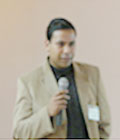
Vineet Tyagi
Vineet Tyagi conceptualized and has been the co-creator of WebROaR - Ruby Application Server (http://webroar.in). Vineet has been dabbling in building successful software products for the past 15+ years, he is an avid supporter of open source technologies and community. Vineet resides near Delhi with his wife and 2 sons and has an opinion (sometimes correct) on everything.
Talk: Let’s build a Ruby application server
Would you like to know how to build an application server from scratch? This talk would provide an insight to the thought process and the key decisions made while building WebROaR from grounds up using C & Ruby.
What enables this server to deliver high performance and also offer a rich bouquet of integrated features like Analytics, Exception Notifications etc? If gaining knowledge about design of a good software product interests you, do join us for this interactive session.
Presentation:
Slides:- http://www.slideshare.net/ThoughtWorks0ffshore/vineet-tyagi-lets-buildrubyappserverSpeech:- http://download01.thoughtworks.com/media/rubyconf/vineettyagi
-

Sarah Taraporewalla
Sarah is a ruby/.net developer currently working for ThoughtWorks. She is a strong believer in working efficiently, good design and people. She currently has two open source projects on the go - Slippers (a String Template port for ruby) and YatFram (Yet Another Testing Framework - a BDD style framework for unit, API and web-testing in .net). Sarah really likes learning concepts and libraries from one language/community and then applying them in a different language/community.
Talk: The Taming of the View
We know that testing is important; that separation of concerns is important; that modeling our domain is important; and that their are often many domains within an application. So why is it that most of the view engines make it so easy to break all these important activities?
View engines, such as erubis and ERB, make it so easy to break the model-view-controller-paradigm by allowing turing-complete code in the view. It is so easy to pull the database into the template by making calls such as
<%= Order.find(:all, :conditions => { :status => 1 }) %>.Oh no! Now separation of concerns is thrown out the window, closely followed by testability and domain modeling.Never fear - there is a better way! By following the teachings of String Template, we can introduce a strict enforcement of the model-view-controller-paradigm. In this session, we will highlight the problems with the existing engines, explore the possibilities of String Template and introduce Slippers - the ruby port of string template.
Presentation:
Slides:- http://bit.ly/d0ffXmSpeech:- http://download01.thoughtworks.com/media/rubyconf/sara2
-

Aman King
Aman King is a developer at ThoughtWorks, Pune, India. He has contributed to successful deliveries of distributed Agile projects with technologies like Java, Rails, and even Java + Rails (JRuby). All of these have been complex web applications, built by teams distributed across the globe. As a speaker, Aman has presented at various events like an Agile talk in Barcamp Bangalore, a Refactoring workshop for Agile Mumbai, Ruby sessions at Ruby FunDay, and guest lectures at institutes.
Talk: Ruby OOP - Objects over Classes
Asked to design an object-oriented solution to a problem, most of us would come up with a list of classes and an idea of how they'd interface with each other. Some might even figure out the class hierarchies and the methods involved, not to mention the methods' arguments. Those who desire further details would begin thinking of the data fields to be placed in the classes. This class-driven technique for coming up with OO solutions is a well-known one, and almost all OO languages support this by providing constructs to represent classes, methods, attributes, inheritance, and so on.
A language like Ruby, however, goes a step beyond to provide certain features that pertain not to classes but to "objects", independent of their class hierarchy. And yes, unlike conventional languages like Java, there is a clear distinction of whether the concept applies at a class-level or an instance-level. Take for example access modifiers:in Java, when a method is made private, its privacy is tied to theclass; two objects can call each other's private methods as long as the calling and called codes reside within the same class definition. In Ruby, if a method is made private, the method cannot be invoked by any other object, even from code that originates within the same class. Similarly, Ruby allows a method to be defined at an object-level, making it available only via that particular instance and not any other object, even of the same class. And, of course, there is "duck typing" which says that for a method to be invoked on an object, what matters is not what class the object belongs to but whether such a method exists for the object or not.
Such features are shifting focus back to the "object", and are gradually leading programmers to think more about objects and their interactions, rather than class-related concerns. This makes for a more lax and open playing field that retains the cleanliness and maintainability of a class-based approach while encouraging newer ideas that tend towards a truly "object"-oriented solution. My session will expound on this thought, providing examples to delve deeper into the OOP mindshift that is coming about and the benefits thereof.
Presentation:
Slides:- http://www.slideshare.net/ThoughtWorks0ffshore/aman-kingrubyoo-pnewSpeech:- http://download01.thoughtworks.com/media/rubyconf/amanking
-

Shreyank Gupta
Shreyank Gupta is a NIT Durgapur Graduate in Computer Science and Engineering and presently works at Red Hat, pune as a Associate software Engineer. Shreyank has been associated with the NIT Durpaur GNU Linux Users' Group in the past and has contributed to LDTP during his college days. Presently Shreyank is the Upstream for Dorrie - A Web Interface for Buding Custom Fedora Variants and some other web apps. Shreyank loves to develop web applications using Ruby on Rails and Django for work and play. He is also loves music and is a Wannabe Deejay.
Talk: Ruby on Rails versus Django - A newbie Web Developer's Perspective
As I have been developing Web Applications for just more than an year now, I can safely introduce myself as a Newbie Web Developer. A year ago, when I started out, my first choice when it came to building Web Apps was Ruby on Rails. The reason was the fascination. There was a steep learning curve from my Python background, but it was all worth it.
Today, working in the industry as a Web Programmer, I program applications in both Ruby on Rails and Django. And during my coffee-breaks, when I sit down and retrospect, I start comparing. And when I compare, I come up with advantages and disadvantages of both the web frameworks.
Both Ruby on Rails and Django are no doubt (in my opinion) the two best Web Frameworks in existence. Both have their own bits of Superiority and Inferiority when compared with the other. My talk aims to put these bits in front of the audience and have a little discussion on the areas of improvements.
Presentation:
Slides:- http://www.slideshare.net/ThoughtWorks0ffshore/shreyank -

Sai Venkatakrishnan
Sai Venkatakrishnan is working with Thoughtworks as a "Developer in Test" Journeyman. He spends his time dreaming about code, thinking in tests and contributing to opensource. He is the author and maintainer of ChromeWatir (A Watir implementation of Google Chrome browser), em-couchdb (A EventMachine based client for CouchDb), flash-watir, silverlight-selenium, schnell-jruby (Watir API using HtmlUnit and JRuby) and rrd-rb (Round Robin database bindings for Ruby). He is interested in topics ranging from evolutionary design, Agile coaching, large scale concurrency, functional languages, Event Driven frameworks, NoSql databases.
Talk: Concurrency patterns in Ruby
Ruby is a wonderful language for rapid development, it is easy to learn, we have wonderful frameworks, an active and dynamic community. But when it comes to concurrency Ruby is plagued with problems, controversies and urban legends. A lot of people would know about green threads in Ruby, GIL and its inherent limitations. But that it only one part of the big picture. Ruby offers much more than threads to helps us with concurrency.
This presentation explores other options of writing highly concurrent applications in Ruby and options available in it. We cover topics ranging from Actor like message passing concurrency in Ruby, dataflow concurrency of how we can coordinate across different threads, Event driven methods, coroutine based concurrency which never blocks ;) and finally Software Transactional Memory. We look at lots of code, some serious looking yet colorful performance graphs comparisons, and conditions at which each of these forms are concurrency are effective and ineffective.
Presentation:
Slides:- http://www.slideshare.net/ThoughtWorks0ffshore/concurrency-patterns-in-ruby-3547211 -

Hemant Kumar
Hemant is the Author of BackgrounDRb and Packet ruby libraries. He has also written network and Web programming frameworks in Scala. He won Redhat Lord of the code - 2005 for co-writing Octave-GTK library. He has been contributing to Ruby libraries such as EventMachine in his free time. He is an avid IRC user and can be found at #ruby-lang, #ruby-pro, #scala and #emacs among many others. He has been working with Ruby professionally for about 4 years and occasionally dabbles in Elisp, Java and Scala too. He is presently employed by Castle Rock Research at Bangalore. He is an avid reader and has read the Lord Of The Rings 6 times. JRR and Wodehouse are his favourites. Personal Home Page: http://gnufied.org
Twitter URL: http://twitter.com/gnufied
Github stuff: http://github.com/gnufiedTalk: Events, threads and writing robust client/servers in Ruby
I have been building client/servers in Ruby for past 3 years and drawing from that experience I would talk about Threads in Ruby, Reactor pattern in Ruby, Eventmachine, Revactor, Packet, Actor pattern in Ruby, protocol parsing (ragel). Touching upon various threading implementation in MRI1.8, Ruby1.9 and JRuby. Best practices regarding threading. Writing threaded clients/servers. When threading model suffices and when it breaks down. Non-Blocking IO in Ruby. Select VS other advanced selectors. When to use NIO model and when to look for alternatives. Using Actor pattern in conjunction with Reactors for better scalability. And at last if time permits, I would present my ideas on building better network protocols and using ragel for protocol parsing.
Presentation:
Slides:- http://github.com/gnufied/rubyconfindiaSpeech:- http://download01.thoughtworks.com/media/rubyconf/hemantkumar
-

Sidu Ponnappa
Sidu Ponnappa writes code because he likes it, and has been doing so since he was six. He cut his teeth in the startup business a few years ago when he co-founded InActiv, the core of which ran Rails. He has spent last five years as a consultant at ThoughtWorks working on a variety of platforms, most recently Ruby.
He blogs at http://blog.sidu.in and tweets at http://twitter.com/ponnappa.
Talk: Managing entropy on long term Ruby and Rails codebases, or how not to kill a Ruby project in eighteen months
All codebases have entropy and tend to degrade over time. Ruby is a hugely flexible language, and as a consequence Ruby codebases tend to suffer more than most from this kind of gradual degradation over time, especially in situations where part of the development team is new to either Ruby, or the project domain or both.
This talk is about all the ways in which a Ruby codebase can be slowly drawn and quartered over time. We will talk about the kinds of the anti-patterns one can expect to see, the smells which indicate their presence and the mechanisms that can be used to prevent their occurrence or minimise their effect on the codebase. Examples are drawn from the presenters' experience working with a suite of integrated Rails applications ranging from four years old (legacy applications in Rails terms) to a few months old as well as their experiences in working on open source Ruby projects.
We will cover runaway meta-programming (someone overwrote Object#responds_to?), poor performance (someone thought creating a Document for *every* response was a good idea - and used REXML) and other issues that are common, weird or simply entertaining.
Presentation:
Speech:- http://download01.thoughtworks.com/media/rubyconf/sidu -

Niranjan Paranjape
Niranjan has recently founded a company specialising in offshore Rails engineering. He has over two years of experience developing and deploying Ruby on Rails applications at large enterprises. He has most recently worked on automating most of the infrastructure management processes at a very large custom web-hosting provider using a suite of over a dozen RESTfully integrated Rails apps.
Talk: Niranjan will be co-presenting the talk titled “Managing entropy on long term Ruby and Rails codebases….” with Sidu Ponnappa
-

Arvind G S
After graduating in Electronics and Communication Engineering joined IBS Software Services. Experienced in C, C++, Pro*C, Unix shell scripting and won the best performer award for the annual year 2007 and 2008. Resigned and started a firm - Foradian Technologies after 2.5 years of experience in IBS as Senior Software Engineer. Currently working as the CTO of Foradian Technologies Pvt Ltd and the Project Director of Fedena - An Open Source School/Campus Management Software by Foradian. Along with these doing research on different platforms like HTML 5.0, CSS 3.0, PHP 5.3.0 and ROR 2.3, web security etc.
Talk: Project Fedena and Why Ruby on Rails
Fedena is an open source school management software based on Ruby on Rails framework. It is a web 2.0 web application being developed by Foradian Technologies. Fedena is currently in closed beta. Visit http://www.fedena.com/ or http://en.wikipedia.org/wiki/Fedena more info.
The first part is about the birth of fedena. And why we chose Ruby on Rails for its development. My team was not experienced in Ruby on Rails. Actually they had no experience on practical programming skills other than the textbook knowledge on C and C++ that they get from and Electronics and Communication degree. They are now experienced programmers in ROR and are actively involved in various opensource ROR projects.
The second part is about our experience on ROR and the advantages and disadvantages we felt while coding and deploying. The third part of the talk is about why we are giving fedena as opensource to the community. The business model of opensource software.
Presentation:
Slides:- http://www.slideshare.net/ThoughtWorks0ffshore/arvind -

Kapil Mohan
Kapil Mohan is Tech Lead at SlideShare. He's been heavily involved in all aspects of building SlideShare's core technology and the technical team. While programming is, and always will be his first love, productizing ideas and building teams, workflows and practices is what keeps him busy mostly. Having seen SlideShare from invention till now gives him a unique end-to-end vision about product development. Also, he's been developing with Ruby (and Rails) for almost 3.5 years, and thinks its a beautiful language. He has a Bachelor's Degree in Information Sciences from Delhi University. Traveling, cooking and spending time with family and friends consumes him in his free time. He writes at kapilmohan.com, tweets @kapilmohan and presents at slideshare.net/kapil.
Talk: Mortal Kombat: Developer vs. Designer
Web front-end engineering has become way more complex than one imagined. There is HTML markup, content, CSS and Javascript intertwined to produce amazing web experiences we see all over the web. And this results in a problem which everyone must have faced - the developer/designer overlap.
Here's an example of a typical development workflow: designers do wireframes, mockups, page layout, visual design, typography, CSS and markup. And hand it over to developers to wire it up with ruby code. It is quite unrealistic to assume that view layer will have zero ruby code (you will, at least, need print statements!). Now, once the markup is wired up with ruby code, maintenance becomes a problem for designers. A designer cannot go back and change the markup without a developer. Also, to multiply the problem, there are partials. So, designer can never look at the markup as ONE single HTML page and make design improvements. And if you'd look closely, the 'hand over markup' part suggests that this entire workflow is NOT agile!
The underlying problem with this workflow is that the code and markup are not 'completely' separate. In an ideal situation, code, markup (page structure), CSS (visual design/style), javascript (behavior), media (flash, images, etc) should all be separate. Separation helps developers and designers focus on what they do best. The designer can focus completely on getting the final page exactly the way they designed it. This includes page structure, semantics, standards, accessibility, and optimization. This lets the developer focus on writing great code and solving their problems. Yes, we are talking about zero ruby code in the view layer.
Enter hquery: Invented by (Chew) Choon Keat from Singapore (github.com/choonkeat), hquery is an unobtrusive server script implementation for Ruby on Rails - github.com/choonkeat/hquery. It is a rails plugin which lets you manipulate HTML markup using selectors etc, almost like jquery, except that it is on server. It was Choon Keat himself who introduced and demonstrated this powerful plugin to us while he was working with us at SlideShare. Since then, we've adopted this markup/code separation technique for all important pages at SlideShare. And it makes our developers and designers much happier. We find them playing Mortal Kombat on PS3 more than in their real lives now.
The idea is that you have 2 files - .hquery and .hquery.html for every webpage you need. .hquery.html is ONE file with entire HTML markup needed to render the page. And, .hquery has code which uses hquery plugin to replace markup in the .hquery.html file with ruby code and turn it into a .erb file. .hquery file is used to compile .hquery.html into .erb files. Obviously, replacing markup with ruby code and then rendering it on the fly will get expensive soon. So, this transformation of plain HTML files to .erb files can happen once during the application deploy step.
The end products (.hquery file and .hquery.html) are more maintainable, especially as logic piles on. There is a clear separation of the designed web page and it's structure (.hquery.html) and the server data that's weaved in (.hquery). The connecting factor is CSS class names that act as hooks to connect the two separate layers.
During the talk, we'd like to show demos of how we use hquery and talk about pros/cons and more advanced stuff like code reuse etc.
Presentation:
Slides:- http://www.slideshare.net/simplyarun/designer-vs-developer-mortal-kombat -

Arun J
Arun J is a designer at SlideShare. Visual design, interaction, markup, CSS are indulgences that keep him busy and forever interested. He's passionate about building beautiful web pages. He believes a project at hand is only complete, if it enriches user experience, has clean and efficient markup, and reflects the timeless principles of typography and graphic design. A fellow wiser than Arun once said, "simplicity is the ultimate sophistication". His work is a constant effort to emulate this.
He has a Bachelor's Degree in Visual Communications from GRD College of Science, Coimbatore. Free time finds himself drawing, tinkering with photography, mountain biking or toying with his artistic playground, Aahsome magazine (aahsome.com). He tweets @SimplyArun and his presentations are at slideshare.net/simplyarun.
Talk: Arun will be co-presenting the talk “Mortal Kombat: Developer vs. Designer” with Kapil
-

Neeraj Kumar
Neeraj Kumar has dealt with numerous technologies which includes Ruby, Ruby on Rails, Ajax, Jruby, Jquery, Java, Javascript, HTML, CSS, C, C++, UNIX etc. over different operating systems like Solarus, Linux, Windows, OS X (MAC). He has developed http://www.cheeseexpress.co.in me which comprises the demonstration of Internationalization (which is also the subject of his talk in RubyConfIndia2010). He has also worked on https://eng.doubledyno.com/, http://www.sugarstats.com/, http://beta.solaro.com etc. projects.
Talk: The Ruby on Rails I18n core API
Across the world, natural or regional languages differ in many ways, (e.g. in pluralization rules). Therefore, Internationalization became a complex problem and it is hard to provide tools for solving all problems at once. Sven Fuchs focused to provide an extensible framework and easy to use gem that is Ruby I18n (internationalization) gem.
The Ruby I18n gem is mainly designed for translating your application to a single custom language other than English or for providing multi-language support for your ruby on rails application. The pivotal point of the new I18n api in Rails is the I18n module which is provided as a gem and shipped with Rails (starting from Rails 2.2) in ActiveSupport’s vendor directory.
Therefore, during my presentation I will try to go over some of the advanced optional features and architecture of I18n gem. Besides, I will also try to cover begin with I18n gem, setup, benefits, the work flow, what's in? and what's not? Etc.
Presentation:
Slides:- http://www.slideshare.net/ThoughtWorks0ffshore/neeraj-the-ruby-on-rails-i18n-core-apiSpeech:- http://download01.thoughtworks.com/media/rubyconf/neerajkumar
-
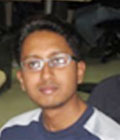
Hari Krishnan
Harikrishnan works as a Developer with ThoughtWorks meditating on Agile and XP principles. He contributes to open source projects and is a "Concurreny paradigms" enthusiast.
Talk: Hari will be co-presenting the talk on “Concurrency patterns in Ruby” with Sai Venkatakrishnan
-
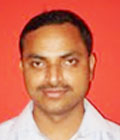
Dasharatham Bitla
"Dash", as fondly called by industry, colleagues and associates, Dasharatham Bitla is the founder of BitlaSoft and mobee.in - an email 2 SMS messaging solution that meets a common mans blackberry dream.
Dash an M.Tech in Electrical Engineering, has more than a decade of experience in architecting, designing, developing, and supporting enterprise class web based products. In particular, he is responsible for building a SaaS based travel management solution at Bitla Software he founded; At Agile Software he managed two enterprise PLM product lines. He worked as a consultant in companies like Sun Microsystems, Lucent Technologies, and First Data Resources to help develop enterprise software products.
A technologist at heart, very well versed with technologies Ruby on Rails, J2EE, Smartphone App development, he serves as the CEO of the Bitla Software where he continues to drive a young team full of enthusiasm and passion for technology as well the future direction of the company. His passion for building innovative products compliments his entrepreneur spirit to make things happen.
Talk: Building cross-platform Mobile (Smartphone) Apps with Ruby & HTML
An introduction to Rhodes” - Mobile Apps Development has taken by storm after the introduction of iPhone and the App Store. Its a long way with others like Android, Blackberry etc entering into the arena. Developing mobile apps for each device and mainting different code bases is not so DRY and its too time consuming. Presenting one of the frameworks that uses Ruby & HTML so effectively in developing crossplatform mobile apps with one single code base all written in Ruby!
Rhodes is an open source Ruby-based framework for building locally executing, device-optimized mobile applications for all major smartphone devices. These applications work with synchronized local data and also take advantage of native device capabilities such as GPS, PIM contacts, camera, and SMS. Yet you write the majority of your interface with high productivity in HTML and Ruby. Rhodes allows you to write an app once and it will then run on all iPhone, Windows Mobile, BlackBerry, Symbian and Android smartphones. During this session we'll build a sample app for all mobile devices, from scratch, in minutes.
Presentation:
Slides:- http://www.slideshare.net/ThoughtWorks0ffshore/dash-bitlaSpeech:- http://download01.thoughtworks.com/media/rubyconf/dash
-

Brendan G. Lim
Brendan is currently the Director of Mobile Solutions at Intridea, Inc. Intridea develops high-performance, agile, Enterprise oriented Web 2.0 applications and services, geared to leverage collaborative technologies, social networking, mobile devices/applications and cloud computing. Before Intridea, Brendan spent his days as a systems architect at a mobile startup called kajeet, Inc. He also found the time to co-found, design, and lead development on Yappd, a microblogging social network, built on Rails, that was featured in such publications as PC Magazine, TechCrunch and Mashable.
Talk: MacRuby to The Max
My presentation will be on the topic of MacRuby. MacRuby is relevent to Ruby developers because it allows us to dive into the world of Mac OS X development using Ruby 1.9. Unlike RubyCocoa, where we would need to use both Ruby and Objective-C, MacRuby's API allows us to just use Ruby.
I will go into a brief history of MacRuby and explain just why it is important to us as Ruby developers. I will then do some live coding of a quick desktop application using MacRuby. Attendees will be able to take away from the presentation a good understanding of MacRuby and the passion to develop something of their own using it.
Presentation:
Slides:- http://www.slideshare.net/ThoughtWorks0ffshore/mac-ruby-to-the-max-3534901Speech:- http://download01.thoughtworks.com/media/rubyconf/brendan
-

Pradeep Elankumaran
Pradeep is the Director of R&D at Intridea, an innovations company based out of Washington DC and the Bay Area that specializes in enterprise collaboration applications. He's also the lead architect of. Presently, an enterprise microblogging app and has been using Ruby well before Rails existed. Apart from Ruby, he's a member of the XMPP Standards Foundation and is very interested in scalable backend systems, machine learning and applying mathematical models to social data.
Talk: The Big Wave of Indian Startups - (Almost) Effortless Entrepreneurship using Ruby
Talk: The Big Wave of Indian Startups - (Almost) Effortless Entrepreneurship using Ruby India's up and coming startup culture is one that's been long-overdue. While the country's large pool of talent and artistic minds is primed nd ready for starting up hundreds of innovative web companies, the reality is that not many exist, and the ones that do rarely compete on the global stage. While the problems facing new companies in India are well-known, there are alternatives to going the 'traditional' startup route.
This open-ended talk will put forth some new techniques for Indian entrepreneurs to compete globally, by leveraging agile and rapid development efforts using Ruby that directly appeal to cash- and time-strapped founders. There will also be some discussion on growing your startup, finding good developers, helping build a community of like-minded individuals locally, and pointers to next steps. The last quarter of the talk will be an open-mic Q&A session that will help directly identify pain points for entrepreneurs in India and possible solutions to the same.
Presentation:
Speech:- http://download01.thoughtworks.com/media/rubyconf/pradeepmessageQ -

Sreekanth V
Sreekanth is a Developer at Thoughtworks, working on projects across the multiple continents and technologies. He is interested in Visualization and Mobile technologies. (@sreeix, github.com/sreeix)
Talk: Hacking and Learning from Open Source Ruby
Presentation:
Speech:- http://download01.thoughtworks.com/media/rubyconf/Sreekanth -

Ivan Porto Carrero
Ivan Porto Carrero is a freelance consultant on .NET and (Iron)Ruby. His experience covers mostly web development. He is currently writing the IronRuby in Action book for Manning publications. Ivan maintains the caricature open source project and contributes patches whenever he needs to, to other projects.
Talk: IronRuby: The Ruby & .NET Love Child
-
Audio(mp3) links...
- Sarah Taraporewalla - http://download01.thoughtworks.com/media/rubyconf/sara2
- Nick Sieger - http://download01.thoughtworks.com/media/rubyconf/nickseiger
- Brendan G. Lim - http://download01.thoughtworks.com/media/rubyconf/brendan
- Aman King - http://download01.thoughtworks.com/media/rubyconf/amanking
- Ola Bini - http://download01.thoughtworks.com/media/rubyconf/ola
- Hemant Kumar - http://download01.thoughtworks.com/media/rubyconf/hemantkumar
- Dasharatham Bitla - http://download01.thoughtworks.com/media/rubyconf/dash
- Vineet Tyagi - http://download01.thoughtworks.com/media/rubyconf/vineettyagi
- Neeraj Kumar - http://download01.thoughtworks.com/media/rubyconf/neerajkumar
- Pradeep Elankumaran - http://download01.thoughtworks.com/media/rubyconf/pradeepmessageQ
- Sidu Ponnappa - http://download01.thoughtworks.com/media/rubyconf/sidu
- Sreekanth V - http://download01.thoughtworks.com/media/rubyconf/Sreekanth
Conference Photos
Get the flash player here: http://www.adobe.com/flashplayer
